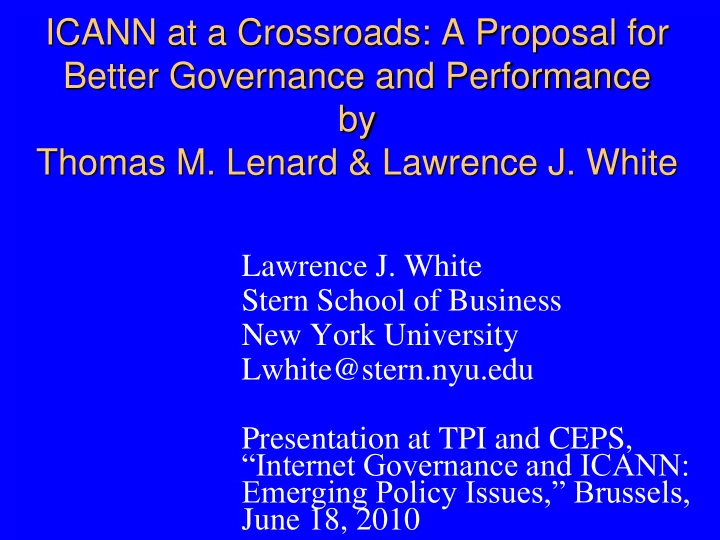

ICANN at a Crossroads: A Proposal for Better Governance and Performance by Thomas M. Lenard & Lawrence J. White Lawrence J. White Stern School of Business New York University Lwhite@stern.nyu.edu Presentation at TPI and CEPS, “Internet Governance and ICANN: Emerging Policy Issues,” Brussels, June 18, 2010
Purpose of our Study • The expiration of the Joint Project Agreement with the U.S. DoC in September 2009 • Examine ICANN’s institutional design – From an economist’s viewpoint – How can its incentive structure be improved? – Best way to approach the “accountability” issue • Examine ICANN’s role as de facto regulator • Recommendations 2
ICANN is Unique • Almost no accountability: external checks – U.S. courts? • Suppose that ICANN moved to the Cayman Islands? • Compare with other organizations: – For-profit corporations: customers, shareholders – Other non-profits: funders, customers – Government agencies: judicial review, electorate • ICANN is accountable only to itself – Ties with U.S. DoC are largely gone • This is not a problem that can be solved by adopting new procedures 3 –
No Good Alternatives • For-profit corporation – ICANN is a monopoly • Government regulation – Which government(s)? – Well-known distortions • Government agency – Which government(s)? – Inefficiencies and political influence • International agency – Inefficiencies and political influence • Best alternative: Improve existing institutional structure 4
Lessons From Other Models • American National Standards Institute • Depository Trust and Clearing Corporation • GS1 US (Uniform Code Council) • International Telecommunications Union • National Automated Clearinghouse Association • Nav Canada • North American Numbering Plan Administrator • Options Clearing Corporation • Universal Postal Union 5
Lessons From Other Models (cont’d) • No other organization operates with ICANN’s independence – Assured and growing income • Other organizations are governed by their direct users • Most also have some form of government oversight 6
Options for ICANN Governance and Accountability • Status quo – Works tolerably well; but – There is little or no external accountability • Suppose that ICANN moved its headquarters to the Cayman Islands? • Oversight by an international organization – Might impede development of the Internet • Modify ICANN’s governance structure 7
Modify ICANN’s Governance Structure • Governance by direct users – registries and registrars – Incentive to assure that ICANN fulfills responsibilities efficiently, with budgetary discipline – Incentives aligned with end users of Internet: businesses and individuals – With pro-competition mandate, unlikely to restrict entry • Should remain subject to antitrust laws • How to get from here to there? 8
Role as De Facto Regulator • ICANN plays “licensing” role – No statutory criteria, procedures, judicial appeal – No professional staff • ICANN should minimize regulatory role – There is competition between TLDs – With recent proposal to expand gTLDs, there will be more competition • Issue of defensive registrations, cybersquatting should be addressed directly 9
Recommendations • Reform ICANN’s governance – ICANN should remain a non-profit – Governed by registries and registrars • Clear mission to encourage competition, open entry into gTLD space • Improved protections for incumbent domain name holders 10
Recommend
More recommend